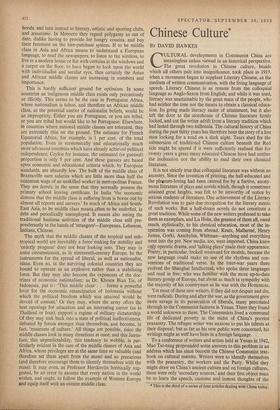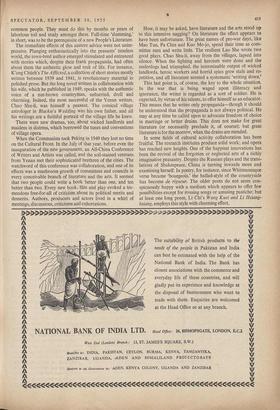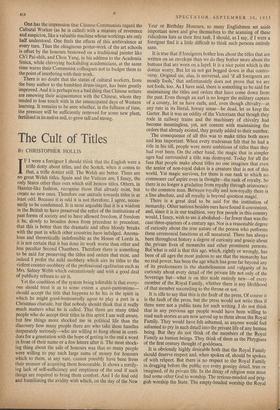Chinese Culture*
BY DAVID HAWKES CULTURAL developments in Communist China are meaningless unless viewed in an historical perspective. The great revolution in Chinese culture, beside which all others pale into insignificance, took place in 1919, when a movement began to supplant Literary Chinese, as the medium of written communication, with the living language of speech. Literary Chinese, is as remote from the colloquial language as Anglo-Saxon from English; and while it was used, literacy was unattainable by the great mass of the people, who had neither the time nor the means to obtain a classical educa- tion. Its going made literacy easier of attainment, but it also left the door to the storehouse of Chinese literature firmly locked, and cut the writer adrift from a literary tradition which had lasted through two millennia. The cultural history of China during the past thirty years has therefore been the story of a lost man looking for a road on a dark night. Tears shed for the submersion of traditional Chinese culture beneath the Red tide might be spared if it were sufficiently realised that for twenty years a great many educated Chinese have had neither the inclination nor the ability to read their own classical literature.
It is not strictly true that colloquial literature was without an ancestry. Since the invention of printing, the half-educated and the pleasure-loving had been catered for by a furtive, anony- mous literature of plays and novels which, though it sometimes attained great heights, was felt to be unworthy of notice by serious students of literature. One achievement of the Literary Revolution was to gain due recognition for the literary merits of such works. But a half-dozen novels do not constitute a great tradition. While some of the new writers professed to take them as exemplars, and Lu Hstin, the greatest of them all, owed much, stylistically, to his classical education, most of the in- spiration was coming from abroad. Keats, Mallarme, Henry James, Gorki, Aeschylus, Whitman—anything and everything went into the pot. New media, too, were imported. China knew only operatic drama, and 'talking plays' made their appearance. Poetry, in particular, looked westward for models, because the new language could make no use of the rhythms and con- ventions of traditional verse. In the inter-war years there evolved the Shanghai Intellectual, who spoke three languages and read in five; who was familiar with the most up-to-date literary gossip of Europe, but about as much in sympathy with the majority of his countrymen as he was with, the Hottentots.
Yet most of these new writers, if they did not despair and die, were radicals. During and after the war, as the government grew more savage in its persecution of liberals, many percolated through to the Communist fastness in Yenan. There they found a world unknown to them. The Communists lived a communal life of dedicated poverty in the midst of China's poorest peasantry. The refugee writer was anxious to put his talents at their disposal; but as far, as his new public were concerned, his writings might as well have been in a foreign language.
To a conference of writers and artists held at Yenan in 1942, Mao Tse-tung propounded some answers to this problem in an address which has since become the Chinese Communist text- book on cultural matters. Writers were to identify themselves with the peasantry, the workers and the Party. Whilst they might draw on China's ancient culture and on foreign cultures, these were only 'secondary sources,' and their first object must be to learn the speech, customs and inmost thoughts of the • This is the third of a series of four articles dealing with China today. common people. They must do this by months or years of laborious toil and study amongst them. Full-time 'slumming,' in short, was to be the prerequisite of a new People's Literature.
The immediate effects of this austere advice were not unim- pressive. Plunging enthusiastically into the peasants' timeless world, the town-bred author emerged stimulated and entranced with stories which, despite their frank propaganda, had often about them the authentic glow and reek of life. For instance, K'ung Chtich's T he Afflicted, a collection of short stories mostly written between 1939 and 1941, is revolutionary material in polished prose. But the long novel written in collaboration with his wife, which he published in 1949, speaks with the authentic voice of a nut-brown countryman, unhurried, droll and charming. Indeed, the most successful of the Yenan writers, Chao Shu-li, was himself a peasant. The comical village astrologer in Blackie's Wedding was his own father, and all his writings are a faithful portrait of the village life he knew.
There were new dramas, too, about wicked landlords and maidens in distress, which borrowed the tunes and conventions of village opera.
When the Communists took Peking in 1949 they lost no time on the Cultural Front. In the July of that year, before even the inauguration of the new government, an All-China Conference of Writers and Artists was called, and the soil-stained veterans from Yenan met their sophisticated brethren of the cities. The watchword of this conference was collaboration, and one of its effects was a mushroom growth of committees and councils in every conceivable branch of literature and the arts. It seemed that two people could write a book better than one, and ten better than two. Every new book, film and play evoked a tre- mendous free-for-all of criticism about its political merits and demerits. Authors, producers and actors lived in a whirl of meetings, discussions, criticisms and exhortations. How, it may be asked, have literature and the arts stood up to this intensive nagging? On literature the effect appears to have been unfortunate. The great names of pre-war days, like Mao Tun, Pa Chin and Kuo Mo-jo, spend their time as com- mittee men and write little. The resilient Lao She wrote two good plays. Chao Shu-li, away from the villages, lapsed into silence. When the fighting and heroism were done and the underdogs had triumphed, the interminable output of wicked landlords, heroic workers and horrid spies grew stale and re- petitive, and all literature seemed a systematic 'writing down.'
This last point is, of course, the key to the whole situation. In the war that is being waged upon illiteracy and ignorance, the writer is regarded as a sort of soldier. He is expected, by virtue of his talents, to offer himself as an educator. This means that he writes only propaganda—though it should be understood that the propaganda is not always political. He may at any time be called upon to advocate freedom of choice in marriage or better drains. This does not make for great literature (or necessarily preclude it, of course); but great literature is for the morrow, when the drains are mended.
In some fields of cultural activity collaboration has been fruitful. The research institutes produce solid work; and opera has reached new heights. One of the happiest innovations has been the revival of the forgotten or neglected arts of a richly imaginative peasantry. Despite the Russian plays and the trans- lations of Shakespeare, China is turning inwards more and examining herself. In poetry, for instance, since Whitmanesque verse became 'bourgeois,' the ballad-style of the countryside has become de rigneur. The older poets do not seem con- spicuously happy with a medium which appears to offer few possibilities except for rousing songs or amusing pastiche; but at least one long poem, Li Chi's Wang Kiwi and Li Hsiang- hsiang, employs this style with charming effect. One has the impression that Chinese Communists regard the Cultural Worker (as he is called) with a mixture of reverence and suspicion, like a valuable machine whose workings are only half understood. One finds the effects of this ambivalence at every turn. Thus the oleaginous poster-work of the art schools is offset by the honours bestowed on a traditional painter like Ch'i Pai-shih, and Chou Yang, in his address to the Academia Sinica, while chivvying backsliding academicians, at the same time warns their Communist colleagues not to badger them to the point of interfering with their work.
There is no doubt that the status of cultural workers, from the busy author to the humblest drum-singer, has been greatly improved. And it is perhaps'not a bad thing that Chinese writers are renewing their acquaintance with the Chinese, whom they tended to lose touch with in the emancipated days of Western learning. It remains to be seen whether, in the fullness of time, the pressure will be sufficiently removed for some new plant, fertilised in its native soil, to grow tall and strong.




































 Previous page
Previous page